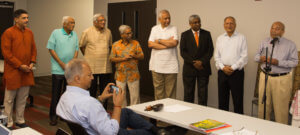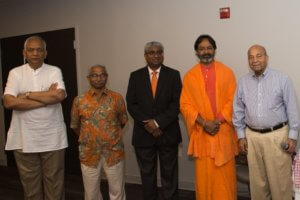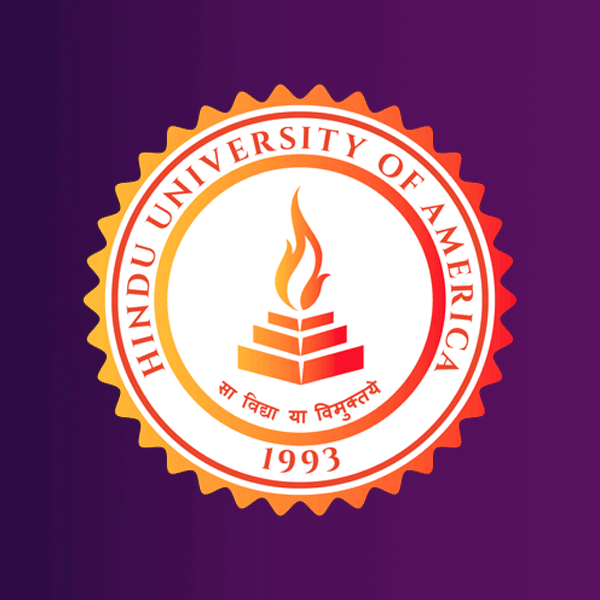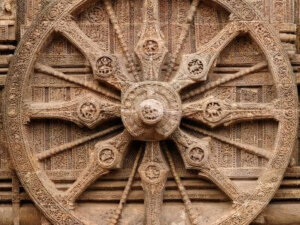Description
The Mahabharata Certificate
Program Code:
MBHC
Course Codes:
6000 – 8000
Credit Hours:
18 Semester Credit Hours
Duration:
2 - 5 years
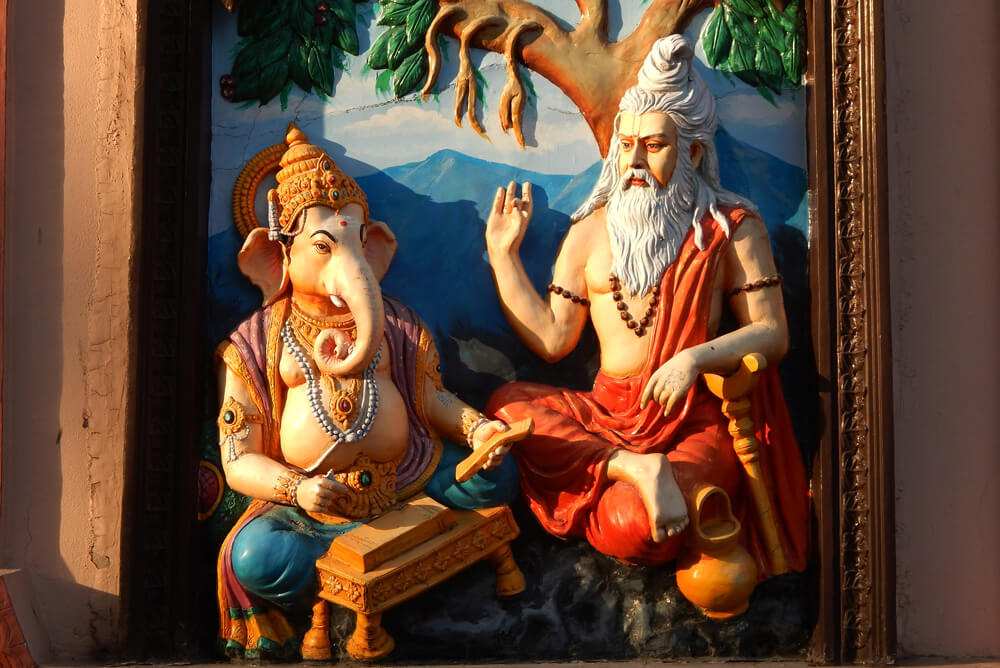
Program Description
The Mahābhārata is a rich and intricate literary masterpiece comprising eighteen books that weave together narrative, action, and contemplation. As a vital source of Indic culture, it has profoundly influenced sculpture, painting, music, literature, drama, and dance across Asia. The philosophical and narrative trajectory of the Mahābhārata offers a nuanced and comprehensive exploration of the human condition.
This certificate program systematically examines the text of the Sanskrit epic in translation, catering to individuals eager to deepen their understanding of Indic traditions. It serves as a bridge between a general cultural awareness of the epic’s characters and events and a more scholarly appreciation of its literary and philosophical dimensions.
Ritual, iconographic, literary, and art-historical insights enhance the philosophical engagement with the epic. The program aims to guide students on a journey of discovery through the literary structure and profound philosophical depth of the Mahābhārata, opening up diverse pathways for cultural and personal exploration.
Program Learning Outcomes
Through the Mahabharata Certificate program, students will be able to:
- Critically engage with the text from a variety of interdisciplinary approaches such as narratology, theology, philosophy, and literary theory.
- Analyze various interpretations of the text, both Western and traditional, and negotiate interpretations that clarify the text’s relationship to classical and contemporary Hinduism.
- Reconcile texts, traditions, and practices.
- Organize textual passages to synthesize creative interpretations that defend Classical Hinduism while adapting these interpretations to contemporary concerns and critical issues.
- Contrast the modern view of history as a linear, progress narrative and its impact on interpreting indigenous conceptions embedded in the Mahabharata.
Written/Video testimonial

How long will this program take?
A reasonable course load suitable for full-time working professionals is 1-2 courses per semester for a graduate-level program. At this rate, the MBHC can be completed in 4—6 semesters (2-3 years).
Who is this Program for?
This course presumes no prior knowledge of the epic, though cultural familiarity with basic ideas of Hinduism is beneficial. The certificate program is designed for all undergraduate and graduate students, continuing education candidates, and professionals in science, technology, or the humanities. The course will introduce students to academic scholarship on the epic and the problems with this scholarship. However, its aim is not “research” but understanding and philosophical insight. Thus, we shall primarily be interested in questions of methods, narrative, ethics, ecology, and the preservation of traditional wisdom; and explore how and whether this can contribute to improving human life here and now. Special attention will be devoted to the messages of self-cultivation of the individual and service to the community found not only in the Bhagavadgītā but also throughout the remainder of the epic.
Prerequisites for the Program:
The Orientation to Hindu Studies Course is a prerequisite to get into this Certificate Program. Students must have completed that course before they may apply for this Certificate. No prior knowledge of Hinduism or the Sanskrit language is required. This graduate-level certificate program will be taught at a Master’s level. Any student who has already completed a Bachelor’s Degree in any discipline is eligible to apply for this Program. Students currently in their undergraduate programs may apply and be admitted at the discretion of the Academic Committee on an exception basis.
Structure of the Program
The Mahabharata Certificate program consists of 18 semester credit hours of coursework. This includes 12 credit hours (i.e., four courses) on the Mahabharata text drawn from the Texts and Traditions area of study. These four courses are required and may be taken in any sequence. In addition, the students must complete six credit hours (i.e., two courses) drawn from the History and Method area of study. These are elective courses, and any two courses from the list below can be taken to fulfill this requirement.
Credits | Courses | |
Texts and Traditions | 12 | 4 |
Hinduism & the West | 6 | 2 |
Total | 18 | 6 |
Courses in the Program
Program Context:
The Mahābhārata certificate program leads the student on a voyage of discovery not only through one of the classics of world civilization but also through the literary structure and profound philosophical rigor of the epic to provide pluralistic avenues for cultural and self-discovery. It is designed for individuals seeking a more profound knowledge of Indic traditions and provides a bridge between an everyday cultural knowledge of characters and events in the epic and a learned appreciation of the text’s literary and philosophical project. It is intended as an entrée into the graduate programs in Hindu Studies.
The graduate programs in Hindu Studies at Hindu University of America are distinctive not only for the breadth of their curriculum, which challenges nineteenth-century Eurocentric notions of “canon,” but also because they seek to understand world cultures as living, mature, and continuing traditions in their own terms. Thus, we shall read the texts of the Indic tradition from literary, theological, and philosophical perspectives rather than the privileged ethnological or historical mode, which has served to objectify and dehumanize the non-Western and non-Christian world.
The Mahābhārata certificate program can be taken as a stand-alone Certificate program or embedded into the MA and PhD Program in Hindu Studies offered at Hindu University of America, with the consent of the Academic Committee.
X
The Mahabharata Certificate
The tuition fee per credit hour for Graduate School courses is $500. The total cost of the MBHC Program with 18 semester credit hours is $9,000. However, students can sign up for annual payment plans that will reduce the cost.
The following payment plans are available:
Pay in Full: $ 7,200 one-time payment. Saving of $ 1,800.
2-Year Payment Plan: $ 3,750 per year, total of $ 7,500 Saving of $ 1500.
3-Year Payment Plan: $ 2,700 per year, total of $ 8,100. Saving of $ 900.
4-Year Payment Plan: $ 2,100 per year, total of $ 8,400. Saving of $ 600.
Pay-as-you-go: $ 1,500 per Course, total of $ 9,000. Full Price.
Pay-per-month: $ 275 per month, total of $ 9,900.
There is also a one-time administration fee of $100 to be paid initially at the time of enrollment in the program.
X
Tuition and Payment
The tuition fee per credit hour for Graduate School courses is $500. The total cost of the MBHC Program with 18 semester credit hours is $9,000. However, students can sign up for annual payment plans that will reduce the cost.
The following payment plans are available:
Pay in Full: $ 7,200 one-time payment. Saving of $ 1,800.
2-Year Payment Plan: $ 3,750 per year, total of $ 7,500 Saving of $ 1500.
3-Year Payment Plan: $ 2,700 per year, total of $ 8,100. Saving of $ 900.
4-Year Payment Plan: $ 2,100 per year, total of $ 8,400. Saving of $ 600.
Pay-as-you-go: $ 1,500 per Course, total of $ 9,000. Full Price.
Pay-per-month: $ 275 per month, total of $ 9,900.
There is also a one-time administration fee of $100 to be paid initially at the time of enrollment in the program.
X
FBL Examples
Example # 1:
Priya (a hypothetical student) is interested in learning more about her family’s ancestral lineage and in enhancing her knowledge and practice of yoga in India. She lives in the United States and is the mother of a young child, so she will not be able to stay at a Yoga Gurukulam for an extended period of time. Priya has located a particular site for her FBL, which meets the criteria. They understand her responsibilities and have told her that a one or two-week stay at the Gurukulam is sufficient; she is able to manage this. She will participate in online courses with the Gurukulam, before and after her stay and is already thinking about how she can make connections with her HUA coursework in Yoga Sutras of Patanjali and other Yoga related courses.
Example # 2:
Kevin (a hypothetical student) is a musician who has been drawn to the spiritual foundations of Bhakti music. He lives in the USA, and is part of a Performing Arts Orchestra, who has been dabbling with his own musical creations based on the Vedic teachings. He is able to visit India for an extended period of time, and designs a 3-month immersion experience for his FBL with a Partner institution in India, which specializes in Classical Indian Music. He is also simultaneously learning Sanskrit through HUA and will be working on developing a deeper appreciation of the lyrics and their meanings from within a Hindu spiritual context. He will be making connections between his HUA coursework on Sanskrit as well as in Hindu Philosophy with the compositions of the Bhakti saints of various genres through his FBL.
Example #3:
Darshana (a hypothetical student) is interested in understanding the Ashram experience more fully. She is able to spend a substantial amount of time at an Ashram in the United States. She combines that experience with a quick 3-week Ashram tour of India to Rishikesh, Coimbatore and Belur, where she is able to develop an immersive understanding of the Ashram experience across multiple Hindu traditions. Her FBL is managed through the relationship with the Ashram in the USA and is able to also incorporate the 3-week travel to India to visit and experience several Ashrams. Through these varied Ashram experiences, she is able to incorporate new practices in her own life, after experimenting briefly with multiple practices being offered at these various sites.







